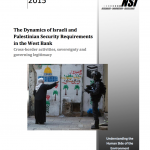Israeli-Palestinian West Bank Cross Border Issues

The Dynamics of Israeli and Palestinian Security Requirements in the West Bank—Cross-border activities, sovereignty and governing legitimacy.
Author | Editor: Astorino-Coutois, A., Bragg, B. & Key, K. (NSI, Inc).
This report presents insights from an analysis of a conceptual map, or qualitative loop diagram that relates Israeli and PA sovereignty and legitimacy in the West Bank territories with Palestinian violence and cross-border attacks against Israeli citizens, as well as IDF/COGAT activities. The relationships and feedback loops of Israeli and Palestinian security and political positions reflect those dynamics that drive the security challenges and risks that impact the effectiveness of PA security sector reform and institutional development. Specifically, the loop analyses suggest that:
PASF capability enhancements can reduce PA legitimacy and limit the effectiveness of security sector reform. PASF capability enhancements seen to also improve security for Israelis can degrade popular support for the PASF, increase social frustration and worsen the security situation in the West Bank. They can also reduce PA legitimacy and reduce the effectiveness of successful security sector reform and institutional capacity building.
Implications for USSC/USG
PASF training/routine emphasizes protection of Palestinians. PASF capability enhancements and training geared toward providing publically observable protection for Palestinians especially in areas associated with Palestinian livelihoods (e.g., orchards) and other areas traversed by Israeli settlers;
Emphasize PASF protection role. Together with visible reemphasis of PASF activities, public affairs communications including outreach to civil society to reinforce message that purpose of PASF is to protect Palestinians can enhance public regard and PA legitimacy;
Emphasize service provision and inclusiveness to enhance PA legitimacy. Other activities to strengthen PA governing legitimacy (e.g., inclusion of alternative views, dependable provision of services) are essential for PA legitimacy and ultimate success of security sector institution building.
Israeli security activities have self-reinforcing adverse effects on PA legitimacy and development of security sector institutions. IDF activity in Areas A and B impact perceived PA governing legitimacy in two ways. Most immediately, IDF security actions, targeted killings, arrests and imprisonment represent an affront to Palestinian national sensitivities and thereby increase the level of social tension in the West Bank. Together with demonstrating the failure of the PA to provide the most basic public service, i.e., security for its citizens, they can diminish popular perceptions of PA legitimacy. Because effective implementation of security sector reforms and institution building require Palestinians to see the PA as legitimate and the PASF as credible, IDF activities also indirectly degrade efforts to build PASF capacity and ultimately to provide security services for Palestinians which feeds into one of the central challenges to the stability of the Fatah-led PA government: the popular appeal and credibility of its phased, institution-building approach versus the approach of Hamas and other actors that highlights rejection and resistance. Completing the feedback loop, impeding the PASF capacity to provide effective security to Palestinians and Israelis in Areas A and B does nothing to reduce Israeli security concerns and reinforces the same, or rising, level of IDF activity in those areas.
Implications for USSC/USG
Advocating for return to more restrictive IDF ROE in the WB including restrictions on live fire, roadblocks and training exercises along with visible reduction in IDF presence in Areas A & B can reduce Palestinian social tension and, if representing observable change can help stabilize day- to-day security situation.
Uncertainty about the final status of the West Bank makes re-opening peace talks more difficult. Uncertainty about the permanence of the current setting in the WB generates two means of decreased WB security. On the one hand it is a direct source of the type of Palestinian social frustration that can lead to violence. On the other, it is a driver of the Israeli government’s accelerated settlement and military establishment construction and consequent illegal seizure and/or destruction of Palestinian land by the Israeli government. This in turn poses an affront to Palestinian notions of national identity, rights and sovereign control, also feeding social frustration and diminishing the popularly perceived governing legitimacy of the PA. Perceived failures of the PA also strengthen the appeal of resistance-based approaches as the only means for dealing with Israel. Given that PA governing legitimacy is so indelibly tied to the phased, institution-building approach established by the Oslo process and the promise of eventual Palestinian statehood (i.e., sovereignty) it significantly weakens any claim to PA governing legitimacy. Unfortunately, it is the PA with which Israel and the US are committed to negotiate a final status agreement and the loss of popular support for the PA coupled with insecure conditions in the Palestinian territories have been used by Israeli leaders as reasons for pulling out of or even engaging in peace talks.
Implications for USSC/USG
US policy supporting “independent, viable and contiguous Palestinian state” has led Israeli governments to create ‘facts on the ground’ and literal barriers to negotiated settlement via land confiscation and military and settlement construction. To Palestinians, US statements, together with settlement construction, can ring hollow or at best are confusing given the intimation of sovereignty associated with “statehood.”

Comments